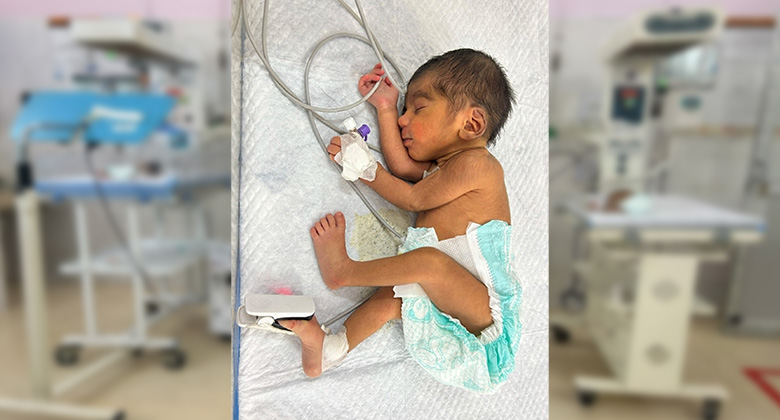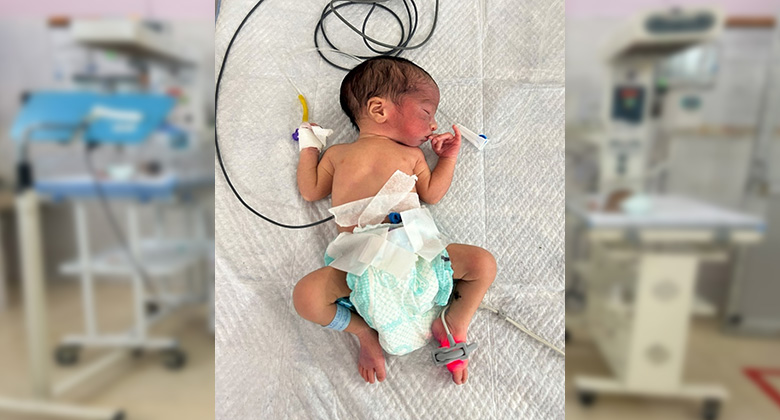
Preterm birth is the leading cause of newborn death globally, with South Asia accounting for a disproportionate share of these deaths. With advancements in medical sciences, most neonates delivered prematurely in high-income nations survive; but this is not true for the low-income countries. In South Asia, for example, the leading causes of mortality among premature newborns are intrauterine hypoxia and congenital infections.
One study from Ethiopia, which was done on preterm newborn babies admitted to a neonatal intensive care unit, found the major causes of death to be respiratory distress syndrome (45%), neonatal infections (30%), and asphyxia (14%). The Child Health and Mortality Surveillance (CHAMPS) study, which was done in seven LMICs (primarily in African sites), found the leading cause of neonatal death to be complications of prematurity (42%).
India has developed the India Newborn Action Plan (INAP) to provide a roadmap towards attaining the goals of ‘Single-digit Digit Neonatal Mortality’ and ‘Single Digit Stillbirth’ rates by 2030. However, neonatal mortality in India is 20 newborns per 1000 live births, and out of these 20, it is anticipated that 1/3 rd to 2/3 rd (7 to 14) newborns succumb due to prematurity and related complications.
According to the World Health Organization (WHO), India has one of the highest rates of premature births globally. In 2020, out of 25 million live births, approximately 30.2 lakh premature births happened in India. At the same time out of 3.2 million live births in 2020, approximately 400 thousand of these occurred in Bihar alone. This suggests that around 12 to 13 percent of deliveries in Bihar are premature. Unfortunately, almost 185 newborns die every day in India, with roughly 67200 of these deaths occurring in Bihar annually.
As per the caste survey 2023, Bihar has a total of around 13.07 crore population. The data indicates that about 94 lakh families – 34.13% of Bihar's total 2.76 crore families – are economically poor and earn less than INR 6,000 a month. The survey also finds that 29.61% of families have monthly incomes ranging between ₹6,000 to ₹10,000. On the contrary, data from the 2021 NITI Aayog’s Multidimensional Poverty Index (MPI) said that 51.91% of the population in Bihar was poor, the highest among all the states. While the NITI Aayog report took many indicators into account, the caste census data was based on just monthly income.

So, access to intensive care in private hospitals for low-income families remains unaffordable or leads to out-of-pocket expenditure. This gives rise to a persistent need to improve the quality-of-service delivery in government facility newborn care, especially at the Special Newborn Care Unit (SNCU).
Premature births can lead to various health complications for the newborn, including respiratory distress syndrome, feeding difficulties, and long-term developmental issues.
Management of preterm newborns involves strategies aimed at supporting their immature organ systems and minimizing complications. For late preterm (34 to 37 weeks) only supportive care with proper counselling of the mother may pay a good dividend. For preterm less than 34 weeks of gestation, three key approaches are antenatal corticosteroid administration to the mother, surfactant administration, and continuous positive airway pressure (CPAP).
Research findings indicate that neonates experiencing respiratory distress have a high case fatality rate of 20%, which constitutes a significant proportion of total admissions in the SNCU. A considerable percentage of total live births, approximately 10%, comprises preterm newborns with a notable proportion suffering respiratory distress. Additionally, many term babies also suffer from respiratory distress syndrome (RDS) and require external respiratory support of CPAP.
In Bihar, although CPAP machines are present in each district hospital, there are many places where these machines are not being utilized optimally. This in turn gives rise to unwanted referrals to higher medical centres. This either leads to a huge patient follow on medical colleges, or deaths in between the transit.

Piramal School of Leadership’s School of Health (PSL-SOH), committed to building Bharat, has initiated dialogues with the Department of Health, Government of Bihar, to support capacity building of SNCU staff for appropriate management of premature babies and effective use of CPAP machines. PSL-SOH is dedicated to transforming the public healthcare system through a comprehensive approach encompassing collaboration, analyses, innovation, and sustainability. Building capabilities within the governmental systems is vital for fostering resilience, innovation, and effectiveness. Deeper collaborations between philanthropic entities and government agencies can help build the capacity needed to tackle complex challenges and drive positive change in the society.
This shift towards responsive governance, coupled with philanthropy's move towards strategic engagement for systemic change, has ushered an era of innovation and empathy in public service delivery. Embarking on an Organizational Development (OD) journey is a strategic move that can greatly enhance the ability to adapt, grow, and effectively deliver healthcare services.
Access to quality healthcare is indeed a fundamental human entitlement. It's a cornerstone of social justice and a critical component of ensuring the well-being and dignity of all individuals. Healthcare should not be a privilege reserved for a few but a right accessible to everyone, regardless of their background or circumstances. By prioritizing the needs of underserved communities and marginalized groups, Piramal Swasthya and the Bihar Health Department aspire to redress historical inequities and pave the way for a healthier, more resilient society.
Ultimately, ensuring equitable healthcare requires a collective effort from governments, healthcare providers, civil society organizations, and individuals alike. It's about fostering a culture of inclusivity, empathy, and solidarity to ensure that no one is left behind when it comes to accessing the healthcare they need to thrive.
TAGS
SHARE





